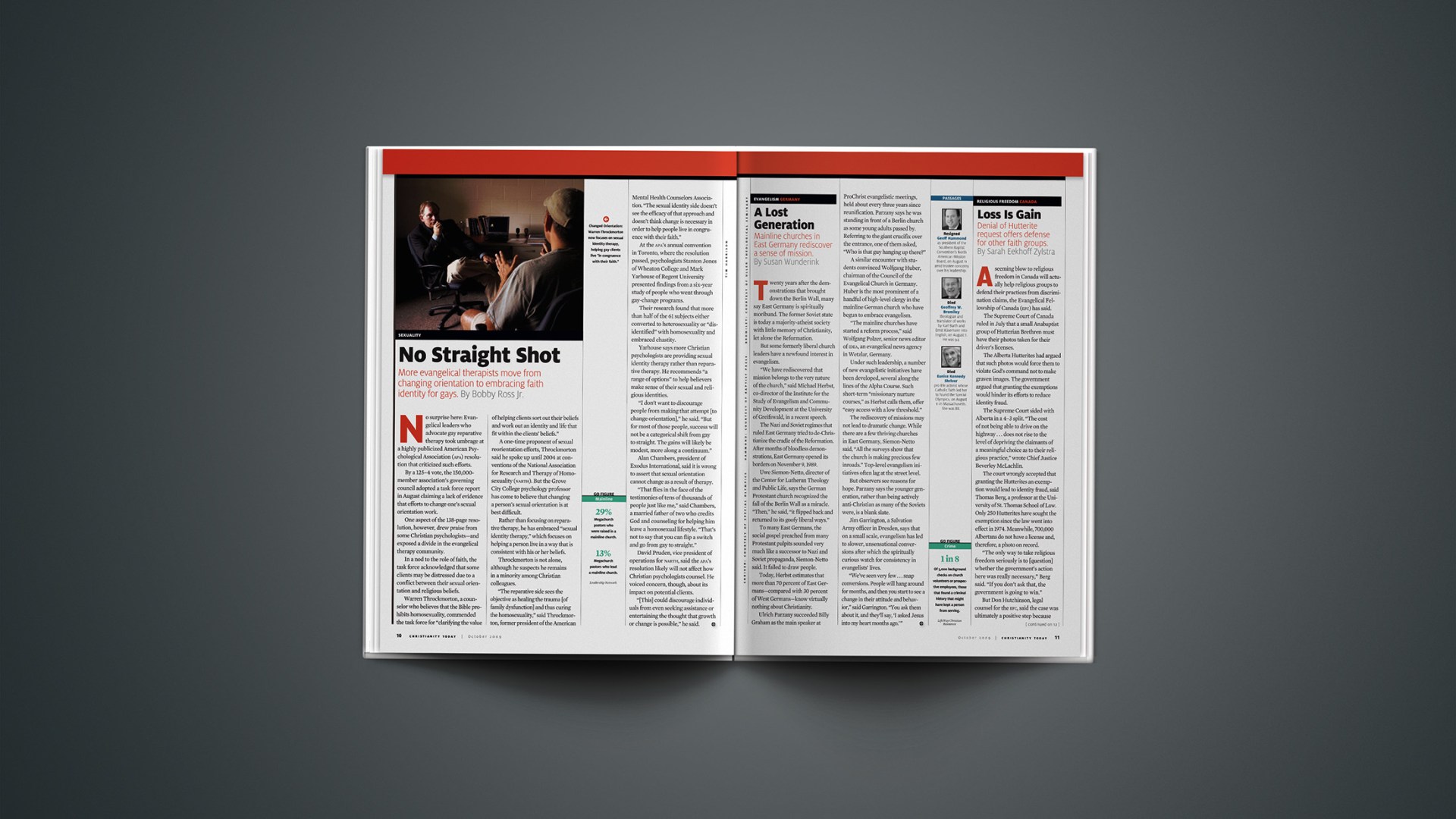No surprise here: Evangelical leaders who advocate gay reparative therapy took umbrage at a highly publicized American Psychological Association (APA) resolution that criticized such efforts.
By a 125-4 vote, the 150,000-member association's governing council adopted a task force report in August claiming a lack of evidence that efforts to change one's sexual orientation work.
One aspect of the 138-page resolution, however, drew praise from some Christian psychologists—and exposed a divide in the evangelical therapy community.
In a nod to the role of faith, the task force acknowledged that some clients may be distressed due to a conflict between their sexual orientation and religious beliefs.
Warren Throckmorton, a counselor who believes that the Bible prohibits homosexuality, commended the task force for "clarifying the value of helping clients sort out their beliefs and work out an identity and life that fit within the clients' beliefs."
A one-time proponent of sexual reorientation efforts, Throckmorton said he spoke up until 2004 at conventions of the National Association for Research and Therapy of Homosexuality (NARTH). But the Grove City College psychology professor has come to believe that changing a person's sexual orientation is at best difficult.
Rather than focusing on reparative therapy, he has embraced "sexual identity therapy," which focuses on helping a person live in a way that is consistent with his or her beliefs.
Throckmorton is not alone, although he suspects he remains in a minority among Christian colleagues.
"The reparative side sees the objective as healing the trauma [of family dysfunction] and thus curing the homosexuality," said Throckmorton, former president of the American Mental Health Counselors Association. "The sexual identity side doesn't see the efficacy of that approach and doesn't think change is necessary in order to help people live in congruence with their faith."
At the APA's annual convention in Toronto, where the resolution passed, psychologists Stanton Jones of Wheaton College and Mark Yarhouse of Regent University presented findings from a six-year study of people who went through gay-change programs.
Their research found that more than half of the 61 subjects either converted to heterosexuality or "dis-identified" with homosexuality and embraced chastity.
Yarhouse says more Christian psychologists are providing sexual identity therapy rather than reparative therapy. He recommends "a range of options" to help believers make sense of their sexual and religious identities.
"I don't want to discourage people from making that attempt [to change orientation]," he said. "But for most of those people, success will not be a categorical shift from gay to straight. The gains will likely be modest, more along a continuum."
Alan Chambers, president of Exodus International, said it is wrong to assert that sexual orientation cannot change as a result of therapy.
"That flies in the face of the testimonies of tens of thousands of people just like me," said Chambers, a married father of two who credits God and counseling for helping him leave a homosexual lifestyle. "That's not to say that you can flip a switch and go from gay to straight."
David Pruden, vice president of operations for NARTH, said the APA's resolution likely will not affect how Christian psychologists counsel. He voiced concern, though, about its impact on potential clients.
"[This] could discourage individuals from even seeking assistance or entertaining the thought that growth or change is possible," he said.
Copyright © 2009 Christianity Today. Click for reprint information.
Related Elsewhere:
Christianity Today also wrote about the American Psychological Association's resolution on Liveblog.
Previous articles on ex-gay ministries include:
An Older, Wiser Ex-Gay Movement | The 30-year-old ministry now offers realistic hope for homosexuals. (September 13, 2007)
The Best Research Yet | Two psychologists show that homosexuals should not be discouraged from seeking change. (September 13, 2007)
Re-engineering Temptation | Fuzzy science sparks debate over treatments to reverse homosexuality. (April 9, 2007)










